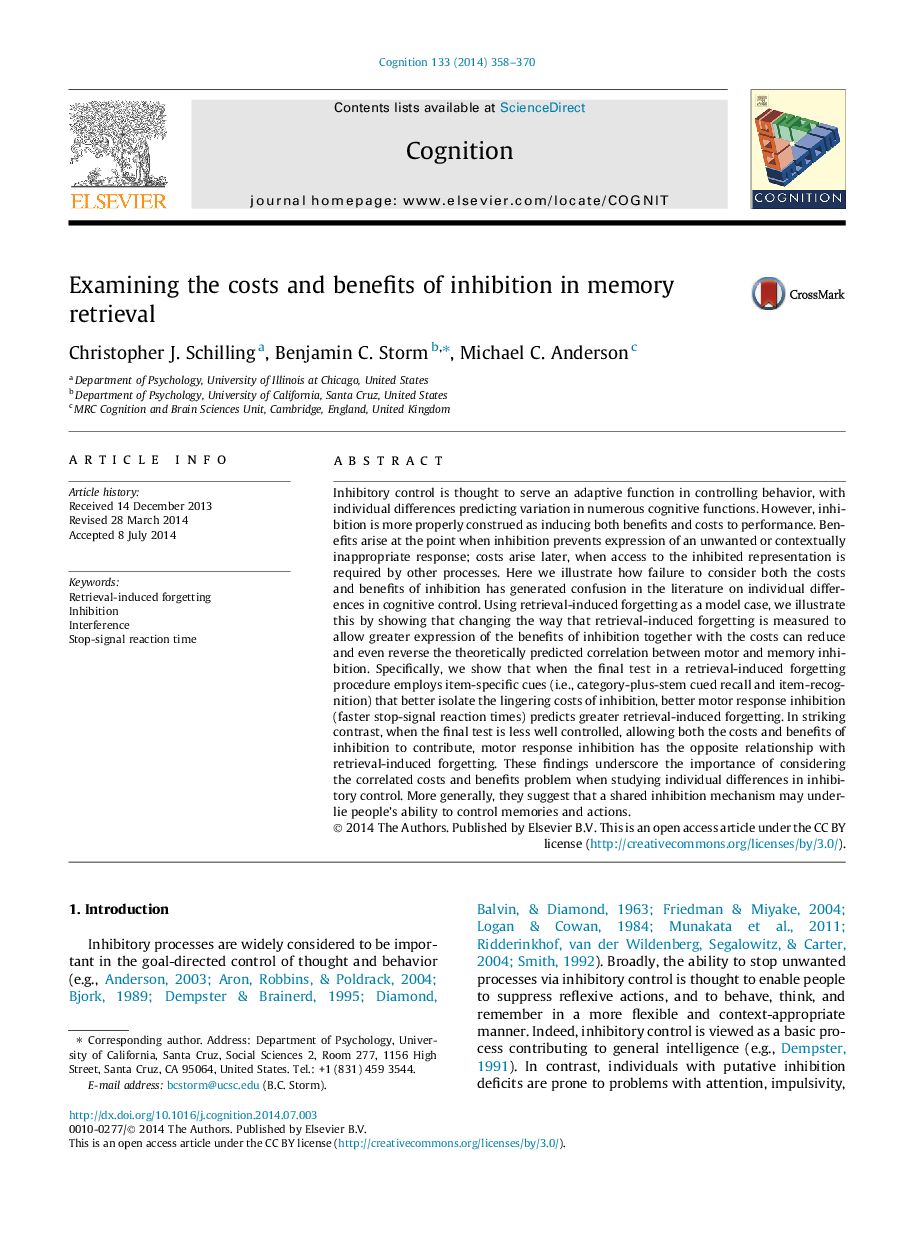| کد مقاله | کد نشریه | سال انتشار | مقاله انگلیسی | نسخه تمام متن |
|---|---|---|---|---|
| 10457504 | 921837 | 2014 | 13 صفحه PDF | دانلود رایگان |
عنوان انگلیسی مقاله ISI
Examining the costs and benefits of inhibition in memory retrieval
ترجمه فارسی عنوان
بررسی هزینه ها و مزایای مهار در بازیابی حافظه
دانلود مقاله + سفارش ترجمه
دانلود مقاله ISI انگلیسی
رایگان برای ایرانیان
کلمات کلیدی
فراموش شدن ناشی از بازیابی، بازداری، دخالت، زمان واکنش سیگنال توقف،
ترجمه چکیده
به نظر می رسد کنترل مهارتی برای تابع سازگاری در کنترل رفتار به کار گرفته شود، با تفاوت های فردی، پیش بینی تغییرات در توابع شناختی متعدد. با این حال، مهار به درستی تفسیر می شود که منجر به دو مزیت و هزینه به عملکرد می شود. مزایا در مواقعی بوجود می آید که مهار مانع بیان یک پاسخ ناخواسته یا ناخواسته می شود؛ هزینه ها بعدا افزایش می یابند، زمانی که دسترسی به نمایندگی مهار شده توسط فرایندهای دیگر مورد نیاز است. در اینجا ما نشان می دهیم که عدم توجه به هزینه ها و منافع مهار، در ادبیات مربوط به تفاوت های فردی در کنترل شناختی، گیج شده است. با استفاده از فراموشی ناشی از بازیابی به عنوان نمونه مدل، ما این را نشان می دهیم که نشان می دهد تغییر دادن راه فراموشی ناشی از بازیابی برای اندازه گیری بیشتر مزایای مهار همراه با هزینه ها می تواند همبستگی پیش بینی شده بین موتورها را کاهش دهد و حتی معکوس کند و مهار حافظه. به طور خاص، ما نشان می دهیم که وقتی که آزمون نهایی در فرایند فراموشی ناشی از بازیابی، نشانه های خاصی را به کار می گیرد (به عنوان مثال یادآوری و تشخیص آیتم)، که بهتر از هزینه های ممانعت از مهار، مهار واکنش بهتر موتور ( سرعت واکنش سیگنال سریعتر) باعث فراموش شدن بیشتر بازیابی می شود. در نگرش قابل توجه، هنگامی که تست نهایی کمتر کنترل می شود و امکان هزینه و منافع مهار را هم به همراه دارد، مهار پاسخ موتور، رابطه فرضی با فراموش شدن ناشی از بازیابی دارد. این یافته ها اهمیت بررسی هزینه ها و مزایای هزینه های همبسته را در هنگام مطالعه تفاوت های فردی در کنترل مهار می کند. به طور کلی، آنها به این نتیجه می رسند که یک مکانیزم مهار به اشتراک می تواند توانایی افراد را برای کنترل خاطرات و اقدامات را زیر نظر داشته باشد.
موضوعات مرتبط
علوم زیستی و بیوفناوری
علم عصب شناسی
علوم اعصاب شناختی
چکیده انگلیسی
Inhibitory control is thought to serve an adaptive function in controlling behavior, with individual differences predicting variation in numerous cognitive functions. However, inhibition is more properly construed as inducing both benefits and costs to performance. Benefits arise at the point when inhibition prevents expression of an unwanted or contextually inappropriate response; costs arise later, when access to the inhibited representation is required by other processes. Here we illustrate how failure to consider both the costs and benefits of inhibition has generated confusion in the literature on individual differences in cognitive control. Using retrieval-induced forgetting as a model case, we illustrate this by showing that changing the way that retrieval-induced forgetting is measured to allow greater expression of the benefits of inhibition together with the costs can reduce and even reverse the theoretically predicted correlation between motor and memory inhibition. Specifically, we show that when the final test in a retrieval-induced forgetting procedure employs item-specific cues (i.e., category-plus-stem cued recall and item-recognition) that better isolate the lingering costs of inhibition, better motor response inhibition (faster stop-signal reaction times) predicts greater retrieval-induced forgetting. In striking contrast, when the final test is less well controlled, allowing both the costs and benefits of inhibition to contribute, motor response inhibition has the opposite relationship with retrieval-induced forgetting. These findings underscore the importance of considering the correlated costs and benefits problem when studying individual differences in inhibitory control. More generally, they suggest that a shared inhibition mechanism may underlie people's ability to control memories and actions.
ناشر
Database: Elsevier - ScienceDirect (ساینس دایرکت)
Journal: Cognition - Volume 133, Issue 2, November 2014, Pages 358-370
Journal: Cognition - Volume 133, Issue 2, November 2014, Pages 358-370
نویسندگان
Christopher J. Schilling, Benjamin C. Storm, Michael C. Anderson,
